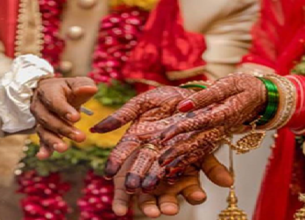SC seeks Government response on including same-sex marriage under Special Marriage Act
26, Nov 2022

Prelims level : Policies
Mains level : GS-II Government policies and interventions for development in various sectors and issues arising out of their design and implementation.
Why in News?
- The Supreme Court has sought the government’s response to pleas to allow solemnisation of same-sex marriage under the Special Marriage Act.
About the Special Marriage Act:
- The Special Marriage Act is a special law enacted to provide for a unique form of marriage by registration wherein the parties to the marriage do not have to renounce their religion.
- This Act includes Hindus, Muslims, Christians, Sikhs, Jains, and Buddhists marriages.
- This act applies to all Indian states, except Jammu & Kashmir.
- This Act applies not only to Indian citizens who belong to different castes and religions but also to Indian nationals who live abroad.
Requirements for the Special Marriage:
- The fundamental requirement under this Act for a valid marriage is the consent of both parties to the marriage.
- If both parties to the marriage are willing to marry each other, that’s enough; caste, religion, race, etc. is not a restriction.
Current scenario in India:
- The acceptance of the institution of marriage between two individuals of the same gender is neither recognized nor accepted in any uncodified personal laws or any codified statutory laws”.
- The centre had also said that contrary to the popular view that homosexuality was legalized by the Supreme Court in the case of Navtej Singh Johar v. Union of India, the court had “only made a limited declaration to decriminalize a particular human behavior, which was a penal offence under S.377 IPC.“
- Observations in ‘Puttaswamy Judgment'(Privacy Case) and ‘Navtej Johar’ case (Section 377 was declared unconstitutional) do not confer a fundamental right to seek recognition of same-sex marriages.
Conditions for Marriage:
- The bridegroom must be at least 21, and at the time of the marriage, the bride must be at least 18 years of age. This is the minimum age limit respectively for a boy/girl to marry.
- At the time of their marriage, both parties must be monogamous; i.e., they must be unmarried and at that time should not have any living spouse.
- In order to be able to decide for themselves, the parties should be mentally fit, i.e., they must be sane at the time of marriage.
Challenges with Contemplating Laws:
- Contemplating laws to regulate matrimonial relationships between two consenting adults would not be just against the constitutional guarantees but would offend the very notion of individuality and basic freedoms.
- Interference of the law in an individual’s choice of marriage violates the existing constitutional rights such as the Right to equality, Right to Freedom & Personal Liberty, Freedom of Religion and Right to Life.
- Article 21: It declares that no person shall be deprived of his life or personal liberty except according to the procedure established by law. This right is available to both citizens and non-citizens.
Way Forward:
- In order to avoid inclusion of any further laws, there should be acceptance of the special marriage act, 1954 at the mental and social level. The rights should not be exploited.
- The marriage of two adults is a complete matter of their own choice, neither a law is to impose any decision, nor any individual. The freedom of decision of his/ her marriage shall lie with the person only. The need is to accept the fact.







